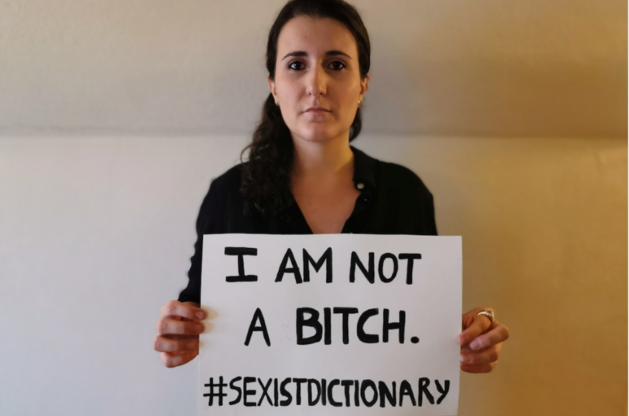Tens of thousands sign petition calling on the Oxford Dictionary to change its ‘sexist’ definition of ‘woman’

Maria Beatrice Giovanardi started the campaign when she realised the Oxford dictionary uses derogatory synonyms and misogynistic examples for the word “woman”. (change.org)
More than 30,000 people have signed a petition calling on the Oxford Dictionary to change its “sexist definition of woman”.
The leaders of Women’s Aid and the Women’s Equality Party are among those who’ve signed the open letter, which calls on Oxford University Press (OUP) to change its dictionaries’ “sexist” definitions of the word “woman”.
According to the Change.org petition, the Oxford dictionary offers a series of synonyms for women, including “bitch, besom, piece, bit, mare, baggage, wench, petticoat, frail, bird, bint, biddy and filly”.
Maria Beatrice Giovanardi, who started the petition, told PinkNews that she had been “astonished” to realise that the definition of woman in the Oxford dictionary “uses derogatory synonyms and misogynistic examples that perpetuate negative stereotypes about women”.
“By contrast, for the word man, the examples and synonyms are exemplary, demonstrating intellect and social status.
“I felt I needed to point out the obvious – that not describing men and women in an equally respectful way, disadvantages women because it perpetuates negative stereotypes that present women as lesser beings, which in turn influences the way women are talked about and treated.
“This is just one of many examples of everyday sexism and how mainstream culture frequently dehumanises women by portraying them as sex objects or subordinate to men.”
The petition is calling on OUP to get rid of all phrases and definitions that discriminate against or patronise women, enlarge the dictionary’s entry for women, and “include examples representative of minorities, for example, a transgender woman, a lesbian woman”.
Giovanardi said that until she started researching the campaign, she was unaware that the dictionary definition of woman is used as a slogan by anti-trans campaigners.
“Women = adult human female” was a slogan begun by Posie Parker, a “gender critical” activist. It has since been seen on t-shirts, placards, and flags – and “Adult Human Female” is often included in the social-media bios of those with “gender critical”, anti-trans, or transphobic views.
“We do not support anti-trans campaigners nor do we have any affiliation with reactionary, regressive anti-trans voices,” Giovanardi said.
“The campaign to change the dictionary’s sexist definition is not only calling for the removal of derogatory terms and synonyms for woman, but also for the inclusion of LGBTQ terms to describe women i.e, trans woman, lesbian woman etc.”
While she says there has been “some backlash from the anti-trans movement”, the reaction to the petition has been broadly positive – as seen by the huge number of people who have signed it.
“We were anticipating people to be outraged but we were not expecting thousands of people to support our call,” Giovanardi said.
“Huge thanks to everyone who joined us in calling this out.”
The letter has been published in time for International Women’s Day on March 8.
A spokesperson for OUP told the Guardian that the company had finished reviewing the dictionary and thesaurus entries for terms for women and girls, and that changes, including more labels that show certain terms are offensive or dated, would be “visible across various platforms in the next few weeks”.

